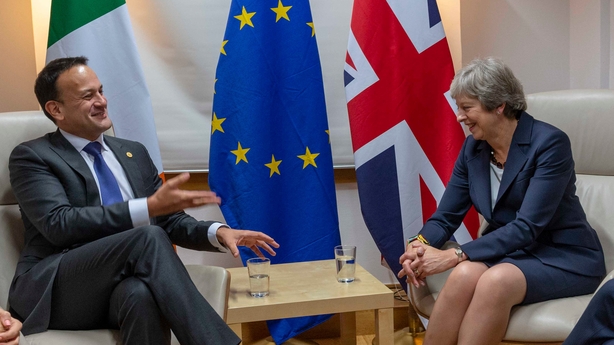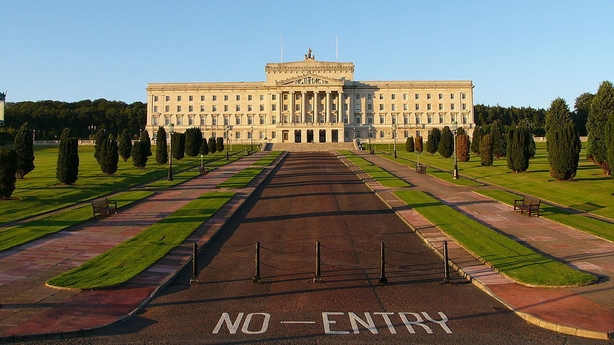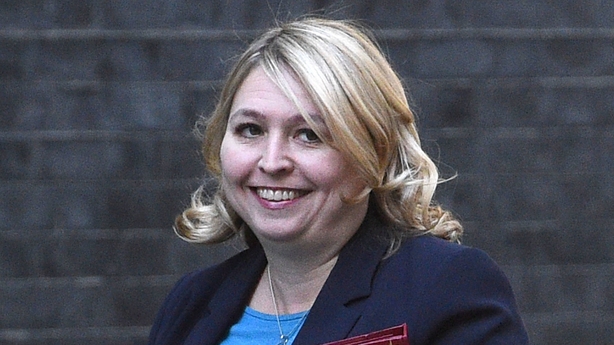British Prime Minister Theresa May has said there may be limited circumstances when it is in Britain's interest to agree to a short extension to the transition period after it leaves the EU.
In a Commons statement following last week's EU summit in Brussels, Mrs May said such an extension would be an alternative to activating the backstop, which is intended to guarantee there is no return to a hard border.
She stressed that in any circumstances, the transition - currently due to end at the end of 2020 - would have to be over "well before" the end of the parliament expected in June 2022.
"There are some limited circumstances in which it could be argued that an extension to the implementation period might be preferable, if we were certain it was only for a short time," she said.
She added: "For example, a short extension to the implementation period would mean only one set of changes for businesses - at the point we move to the future relationship.
"But in any such scenario we would have to be out of this implementation period well before the end of this parliament."
We need your consent to load this rte-player contentWe use rte-player to manage extra content that can set cookies on your device and collect data about your activity. Please review their details and accept them to load the content.Manage Preferences
Mrs May faced a furious response from some Tory MPs after it emerged that the possibility of an extension to the transition period - currently due to run for 21 months - had been discussed by EU leaders in Brussels.
It prompted accusations the UK could be forced to pay billions to the EU for months - or even years - to come after it has left the EU.
Mrs May said while the terms of the withdrawal agreement were now 95% agreed, there remained an "impasse" over the border issue.
She made clear she would not accept a situation in which the UK could be kept "indefinitely" in either an extended period of transition or a backstop that tied the UK to EU customs rules.
"We would not accept a position in which the UK, having negotiated in good faith an agreement which prevents a hard border in Northern Ireland, nonetheless finds itself locked into an alternative, inferior arrangement against our will," she said.

Reacting to Mrs May’s speech, a spokesperson for Taoiseach Leo Varadkar said: "Brexit negotiations are conducted between the Task Force and the UK.
"Ireland will listen to proposals that the UK brings forward, but any proposal has to be legally operative in ensuring that we avoid a border between Northern Ireland and Ireland.
"It has to protect the integrity of the Single Market and the Customs Union, and it has to apply unless and until we have a new relationship that supersedes it.
"That’s why Ireland is encouraging ongoing dialogue between the Task Force and the UK."
Sinn Féin Leader Mary Lou McDonald has said Mrs May still has not grasped that Ireland is a special and particular case.
She said the prime minister must realise that a temporary backstop is not a backstop at all. She said that the backstop agreed last December is the bottom line and it cannot be diluted.
Yesterday, Mrs May's Brexit Secretary Dominic Raab said Britain was open-minded about extending the transition period, if it meant that the EU dropped its proposals for the so-called backstop.
Meanwhile, a British Conservative MP is set to propose an amendment to legislation that would mean the Northern Ireland Assembly in Stormont would have to vote to agree any Brexit backstop mechanism.
Steve Baker is hoping to bolt his proposal onto a bill being taken through Westminster by Secretary of State for Northern Ireland Karen Bradley, focused on making it easier for civil servants to take major decisions in Northern Ireland in the ongoing absence of devolved ministers.
Asked about Mr Baker's amendments, Ms Bradley insisted the bill was not designed to change policies.

Mrs May has rejected the EU's proposal - for Northern Ireland to remain in the customs union - as it would potentially create barriers to trade with the rest of Britain.
Mr Baker, a prominent Brexiteer and former junior Brexit minister, will try to block the EU's backstop plan on Wednesday by attaching amendments to legislation passing through parliament.
Northern Ireland has been without a fully functioning executive since January 2017, and Mr Baker's amendment would prevent officials acting in the absence of a devolved government to implement any trade or regulatory barriers between Northern Ireland and mainland Britain.
"DUP will back amendment being tabled by Tory Eurosceptics on Wednesday that will effectively make the EUs NI backstop illegal," Steven Swinford, the Telegraph's deputy political editor, said on Twitter.
"Yet another headache for No. 10, with 40 Tory MP already poised to support it."
Brexit: A brief history of the backstop
The DUP, whose 10 MPs provide Mrs May with a slim working majority in parliament, say the EU's backstop proposal would tear Northern Ireland from the rest of Britain.
The DUP had no immediate comment on the report.
Only seven Conservative politicians have to rebel for Mrs May to lose a vote in parliament, if all opposition party MPs vote against the government, so if 40 Conservatives backed the amendment the DUP's decision would not sway the outcome.
But the scale of votes against the government could provide an indication of how many may ultimately refuse to back any final Brexit deal with the EU when it is voted on in parliament.
The Times of London reported that the Labour Party was likely to abstain on the amendment, however, meaning the government would still win the vote. A spokesman for the Labour Party said it would make a decision later.
Mrs May's spokesman said the government would look at the amendments "in the usual way".
"It's worth pointing out the legislation's purpose: it is necessary to provide the Northern Ireland civil service with the certainty and clarity they need to continue to deliver public services," he told reporters.

Meanwhile, Northern Ireland Secretary of State Karen Bradley has said the British government is committed to ensuring there is no border on the island of Ireland.
Addressing a meeting of the British-Irish Parliamentary Assembly in London, she said: "A suggestion has been put forward last week at the European Council regarding an extension of the implementation period as a way to deal with the border.
"Now, we are looking at that. It is early days. It is a suggestion that has been put forward by the EU.
"And I want to be clear that we are committed to everything that we have agreed to in the joint report and we will ensure that there is no border on the island of Ireland."

